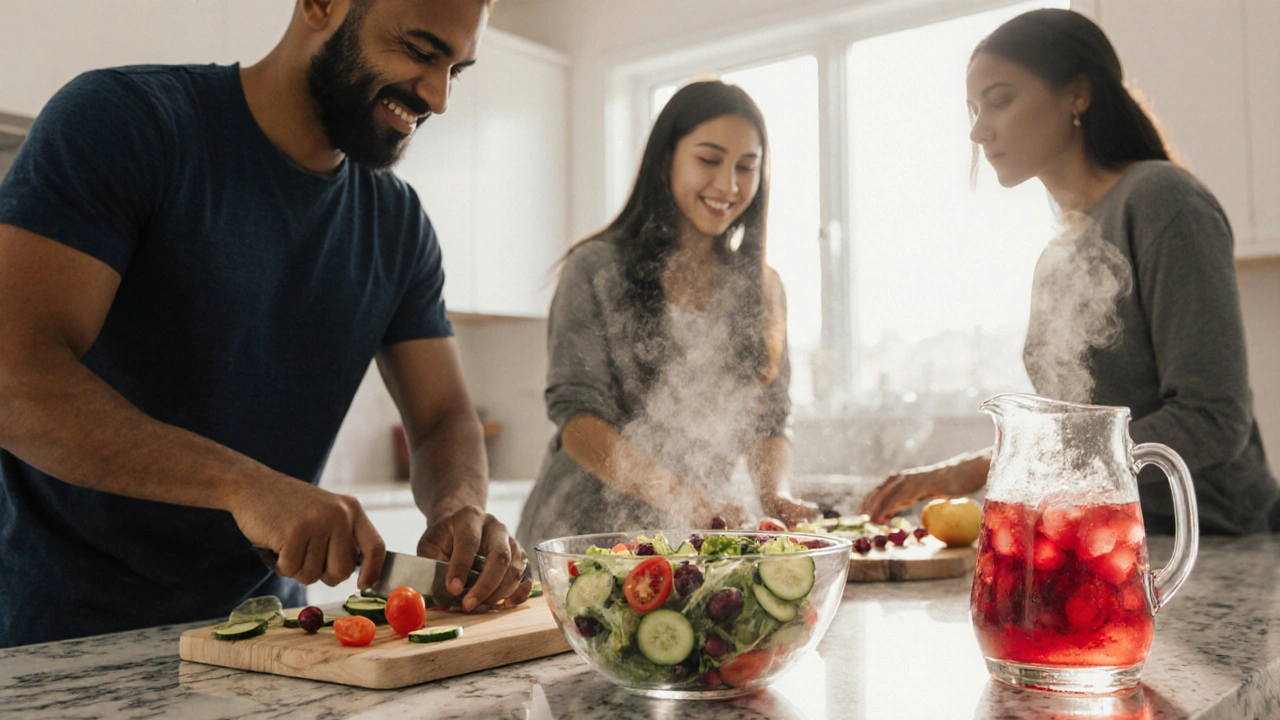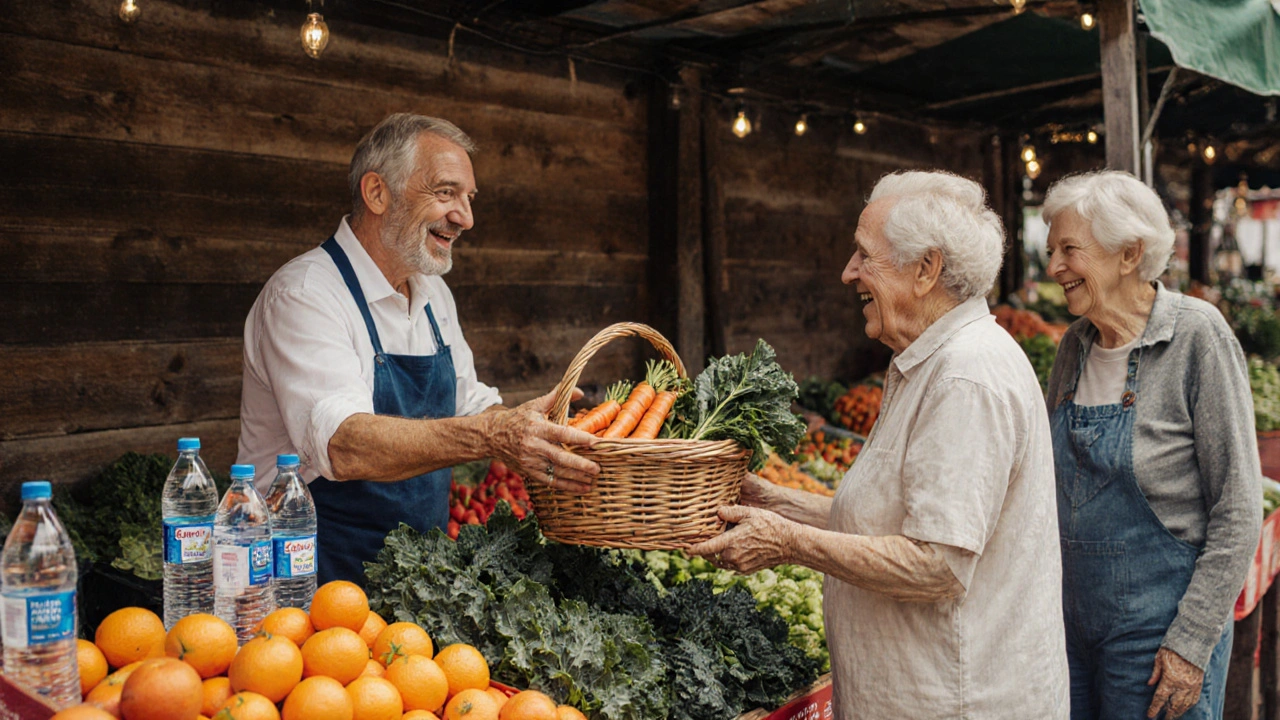Diet Strategies to Prevent and Treat Bladder Infections
 Sep, 28 2025
Sep, 28 2025
bladder infection diet
- Drink plenty of water - aim for at least 2liters daily.
- Include cranberry or D‑mannose to block bacterial adhesion.
- Eat probiotic‑rich foods like yogurt or kefir to restore healthy urinary flora.
- Boost vitamin C intake with citrus fruits or bell peppers.
- Limit sugar, caffeine, and artificial sweeteners that irritate the bladder.
What a bladder infection actually is
When we talk about a bladder infection is a type of urinary tract infection (UTI) that inflames the bladder lining, causing pain, urgency, and sometimes fever, diet can play a surprisingly big role. Most cases are caused by Escherichia coli, a gut bacterium that travels up the urethra. While antibiotics clear the infection, the foods you eat before, during, and after treatment can either set the stage for recurrence or help the body heal faster.
How what you eat affects bladder health
The bladder environment is shaped by three main dietary factors:
- Urine acidity - acidic urine discourages bacterial growth, while overly alkaline urine can provide a friendlier habitat for E.coli.
- Fluid volume - the more you sip, the more you flush out bacteria before they can stick to the bladder walls.
- Microbial balance - a gut rich in good bacteria supplies the urinary tract with protective species via the gut‑bladder axis.
Each of these can be nudged in the right direction with everyday foods.
Foods and drinks that help prevent bladder infections
The following ingredients have the strongest evidence for reducing the risk of cystitis.
- Cranberry is a fruit packed with proanthocyanidins that stop E.coli from latching onto the bladder wall. Fresh, unsweetened juice (no more than 8oz per day) or a standardized extract delivers the benefit without the sugar overload.
- D‑mannose is a naturally occurring sugar found in apples and berries that also blocks bacterial adhesion. A typical supplement dose is 500mg taken twice daily during high‑risk periods.
- Probiotic foods such as plain yogurt, kefir, or fermented vegetables introduce lactobacilli that compete with E.coli in the urinary tract.
- VitaminC raises urine acidity, creating an environment less hospitable to bacteria. One medium orange or a half‑cup of red bell pepper provides roughly 70mg of vitaminC.
- Water is the universal cleanser. Drinking enough to produce clear, pale urine (about 1.5‑2L for most adults) flushes out microbes before they settle.
Foods and habits that can worsen a bladder infection
- Sugar - high‑glycemic foods feed harmful bacteria and raise urine glucose, which some E.coli strains love.
- Caffeine - coffee, tea, and energy drinks irritate the bladder lining, making urgency worse.
- Artificial sweeteners - aspartame and saccharin have been linked to changes in gut flora that may increase UTI risk.
- Spicy foods and acidic fruits (unless balanced with plenty of water) can sting an already inflamed bladder.

Quick‑reference comparison of preventive foods & supplements
| Item | Primary action | Evidence level | Typical dose/serving |
|---|---|---|---|
| Cranberry juice (unsweetened) | Blocks bacterial adhesion | Moderate (meta‑analysis 2017) | 8oz daily |
| D‑mannose supplement | Prevents E.coli attachment | Strong (RCT 2020) | 500mg twice daily |
| Probiotic yogurt (live cultures) | Restores urinary microbiome | Moderate (cohort 2019) | 1 cup per day |
| VitaminC‑rich foods | Acidifies urine | Low (observational) | 1orange or ½cup bell pepper |
| Water | Flushes bacteria | Strong (clinical guidelines) | 2L daily |
Building a bladder‑friendly day on a plate
Here’s a sample menu that stitches the evidence‑backed foods together without feeling like a medical regimen.
- Breakfast: Greek yogurt with a handful of fresh blueberries, a drizzle of unsweetened cranberry sauce, and a glass of water.
- Mid‑morning snack: A small apple (provides natural D‑mannose) with a cup of herbal tea (caffeine‑free).
- Lunch: Mixed greens topped with grilled chicken, orange segments, sliced red bell pepper, and a vinaigrette made with olive oil and a splash of lemon juice. Follow with 500ml of water.
- Afternoon: A probiotic kefir shake blended with a banana and a spoonful of unsweetened cranberry powder.
- Dinner: Baked salmon, quinoa, steamed broccoli, and a side of sauerkraut (fermented cabbage). End the meal with another 500ml of water.
Adjust portion sizes to fit your caloric needs, but keep the core principle: hydrate, add a source of cranberry or D‑mannose, and balance with probiotic‑rich foods.
Common pitfalls and how to dodge them
- Too much juice - sweetened cranberry drinks add sugar that can counteract the anti‑adhesion benefits. Stick to unsweetened or use powdered extracts.
- Relying on supplements alone - D‑mannose helps prevent adhesion, but without adequate water intake the bacteria still have a chance to build up.
- Skipping fluids because of caffeine - if you love coffee, limit it to one cup and replace the rest of your beverages with water or herbal tea.
- Ignoring personal tolerance - some people find acidic fruits irritate an already sore bladder. Pair them with plenty of water or choose milder vitaminC sources like kiwi.
When diet isn’t enough
Even the best diet won’t cure a full‑blown infection on its own. If you experience fever, flank pain, or symptoms lasting more than 48hours, seek medical care. Antibiotics remain the first‑line treatment, and dietary measures are most useful as adjuncts and for preventing recurrences.

Frequently Asked Questions
Can I rely only on cranberry juice to prevent UTIs?
Cranberry helps stop bacteria from sticking to the bladder, but its effect is modest. Pair it with plenty of water, probiotics, and, if you’re at high risk, a D‑mannose supplement for the best protection.
How much D‑mannose should I take during an infection?
Studies show 500mg taken twice a day for up to a week can reduce symptom severity when used alongside antibiotics. Always check with a healthcare provider before adding it.
Are probiotic supplements better than food sources?
Whole‑food sources like yogurt, kefir, and fermented vegetables provide a broader range of strains and additional nutrients. Supplements can be useful if you’re lactose‑intolerant or need a specific strain, but they shouldn’t replace a balanced diet.
Does coffee really irritate the bladder?
Caffeine is a mild diuretic and can increase urgency in some people. If you notice a pattern, try cutting back or switching to decaf and see if symptoms improve.
What’s the role of vitaminC in bladder health?
VitaminC acidifies urine, creating an environment that hampers bacterial growth. A daily intake of 70‑90mg (one orange or half a red bell pepper) is enough for most adults.


Jana Winter
September 28, 2025 AT 07:20I appreciate the thoroughness of the guide, but a few grammatical slips detract from its credibility. The advice to avoid artificial sweeteners is solid, yet the phrasing could be clearer. Also, while the tone is mostly supportive, some statements feel overly assertive. Overall, good effort, just tighten up the language.
Linda Lavender
October 7, 2025 AT 13:34When I first glanced at this guide I felt as though I were stepping onto a stage draped in the finest culinary silk.
The author unabashedly attempts to turn a mundane health regimen into a symphonic masterpiece of probiotic prose.
Yet, between the flamboyant alliterations and the ornate enumeration of vitamin C sources, the practical soul of the advice becomes lost in a fog of pretension.
One cannot help but notice how the list of “preventive foods” reads like a boutique menu at a five‑star restaurant that only serves the elite.
Cranberry juice, that ruby elixir, is praised as if it were the holy grail, while the humble apple-a natural reservoir of D‑mannose- is relegated to an afterthought.
The suggested water intake, a modest two liters, is framed with the gravitas of a sacred oath, demanding devotion from even the most casual tea‑drinker.
Moreover, the admonition to shun caffeine and artificial sweeteners feels less like evidence‑based counsel and more like a moral indictment of modern indulgence.
In the grand tapestry of diet and urology, the author weaves threads of scientific fact with ribbons of hyperbole, creating a tapestry that dazzles but sometimes obscures the essential pattern.
Readers seeking a straightforward regimen may find themselves tangled in the verbose descriptions of “acidifying” urine with citrus.
While the recommendation to embrace probiotic‑rich foods is commendable, the prose inflates the modest kefir drink into a veritable elixir of immortality.
There is a certain theatricality in describing the bladder as a “stage” upon which bacteria perform their tragic drama.
Such dramatization, though entertaining, risks alienating those who simply wish to prevent a recurrent infection without attending a culinary opera.
Nevertheless, the guide does succeed in highlighting the importance of hydration, a point that resonates with the simplicity of a well‑tuned instrument.
If one can strip away the embellishments, the core advice remains sound: drink water, consider cranberry or D‑mannose, and nurture a balanced microbiome.
In the end, the reader is left to decide whether to savor the lyrical flourishes or to cut straight to the practical meat of the matter.
Crystal McLellan
October 16, 2025 AT 19:47lol they dont tell u that the govt is hiding the real cure its all about the big pharma profit scheme u cant trust any of this so called "research" its just a distraction dont drink that juice i heard it contains hidden chemicals
Kelly Thomas
October 26, 2025 AT 02:00Hey there! 🌟 I love how this post breaks down practical steps without getting too clinical. Adding a splash of unsweetened cranberry to your morning routine can be a game‑changer, and pairing it with a probiotic‑rich kefir shake creates a tasty shield against pesky bacteria. Keep the water flowing – think of each glass as a tiny river flushing out unwanted guests. If you ever feel the urge to skip the D‑mannose supplement, just remember that fresh apples are a natural source – a simple snack that does the trick. Stay vibrant and keep those bladder‑friendly habits rolling!
Mary Ellen Grace
November 4, 2025 AT 07:14i think this is greaat i love the ideas but i keep tripping over the tipes like der the water amount is ok but sometimes i forget to drink enough maybe set a reminder on ur phone also love the kefir suggestion sups but i am not a fan of cranberry juce its too sour for me.
Carl Watts
November 13, 2025 AT 13:27Contemplate, dear reader, for the bladder serves as a mirror to the garden of our interior. When we flood this vessel with pure water, we echo the ancient ritual of cleansing the soul. Yet, the very act of abstaining from caffeine becomes a paradox-a sacrifice that awakens deeper awareness of our corporeal limits. Thus, the diet proposed is not merely sustenance, but a philosophy of intentional consumption.
Brandon Leach
November 22, 2025 AT 19:40Sure, because drinking water is the hardest thing ever.
Alison Poteracke
December 2, 2025 AT 01:54Great summary! If you’re new to this, start with a daily glass of water and a cup of plain yogurt. Those small steps are easy and set a solid foundation for the rest of the plan.
Marianne Wilson
December 11, 2025 AT 08:07While the advice is well‑intentioned, I must respectfully disagree with the blanket condemnation of caffeine. Moderation, not elimination, is often the key, and many reputable studies support a nuanced view. Moreover, labeling artificial sweeteners as uniformly harmful ignores the substantial evidence showing they can be a safer alternative for some individuals. Therefore, let’s avoid moralizing and focus on balanced, evidence‑based recommendations.
Patricia Bokern
December 20, 2025 AT 14:20OH MY GOSH this whole "drink water" thing is probably a ruse by the secret water cartel to keep us all thirsty and buying bottled stuff! They don’t want us to know the real cure is hidden in ancient herbal scrolls that the government has buried for centuries.
Garrett Gonzales
December 29, 2025 AT 20:34The protocol outlined aligns with current clinical guidelines on urinary tract infection prophylaxis. Incorporating D‑mannose (500 mg BID) leverages its anti‑adhesive properties, while probiotic lactobacilli confer colonization resistance via competitive inhibition. Ensuring a urine output >2 L/day facilitates mechanical clearance of uropathogens, reducing the bacterial load threshold required for infection onset.
Aman Deep
January 8, 2026 AT 02:47Ah, the dance of nutrients and microbes – a delicate choreography that mirrors the very rhythm of existence. 🌿 When we sip crystalline water, we honor the ancient rivers that have whispered secrets to the stars. And those vibrant cranberries? They are the rubies of the earth, gifting us with resilience. Let us not forget that every bite is a verse in the poem of health. 😊
Herman Bambang Suherman
January 17, 2026 AT 09:00Stick to the basics: hydrate, add a probiotic snack, and consider a small D‑mannose dose if you feel at risk. Those steps are simple and effective.
Meredith Blazevich
January 26, 2026 AT 15:14I totally get how overwhelming all these suggestions can feel, especially when you’re already dealing with discomfort. The good news is that you don’t have to adopt everything all at once. Start with something as simple as a glass of water every hour – it’s a tiny habit that can make a huge difference. Then, maybe add a serving of yogurt or kefir to introduce those friendly bacteria. Little victories add up, and before you know it, you’ll have built a solid bladder‑friendly routine.
kevin muhekyi
February 4, 2026 AT 21:27Hey folks, love the conversation! Just wanted to shout out how awesome it is that we’re all sharing tips. Keep the positivity flowing and stay hydrated – your bladder will thank you!